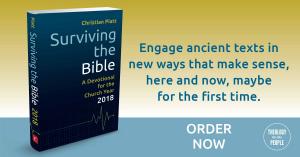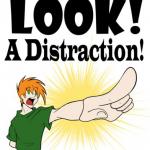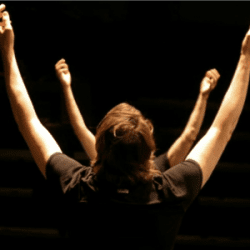The following is excerpted from SURVIVING THE BIBLE by Christian Piatt. With the beginning of Advent comes also the start of a new Church year. As we wait for Hope, Peace, Joy and Love to be re-born, it’s also a time to revisit our Biblical roots and sit in a space of waiting, contemplation and practice.
The Bible clearly says….
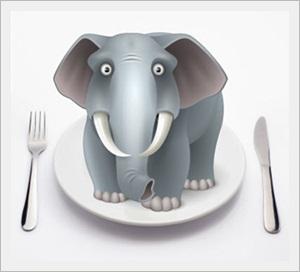 We’ve all heard this phrase, usually in the middle of some ideological combat about “values.” And yet, it seems like we tend to use the Bible to reinforce whatever we already believe. But when we see what we want to see in scripture, it mutates from being a light and path to being a sword and shield.
We’ve all heard this phrase, usually in the middle of some ideological combat about “values.” And yet, it seems like we tend to use the Bible to reinforce whatever we already believe. But when we see what we want to see in scripture, it mutates from being a light and path to being a sword and shield.
As Anne Lamott says, “’You can safely assume you‘ve created God in your own image when it turns out that God hates all the same people you do.”
That, or the whole thing feels too big, complicated, beyond our reach. So many people understand it better than we do. At the same time, we have this need to connect, to find wisdom in its pages. We feel a pull back to it, over and again. And in a time of “alternative facts,” when we long for something true, something real to offer us some deeper wisdom, we wonder what scripture really says about climate change, war, sexuality, gender roles and money. We would welcome its guidance, if we only knew how to get at it.
I have tried, more than once, to read the Bible from start to finish. Maybe you have too. I can’t count how many times I started with Genesis and, by the time I get to the labyrinth of laws in Numbers (if not before), I give up. That’s why I’m writing this three-book series called Surviving the Bible.
The Bible is the Bestselling printed volume in world history. It was the very first thing printed after the printing press was 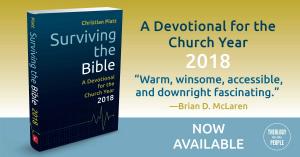 created, and it’s sold over 2.5 billion copies since. Over 100 million copies are sold or given away every year, or more than 190 every single minute. The entire Bible has been translated into more than 650 languages; the New Testament has been translated into more than 1,400. It’s consistently at the top of the list of favorite books in America when people are surveyed.
created, and it’s sold over 2.5 billion copies since. Over 100 million copies are sold or given away every year, or more than 190 every single minute. The entire Bible has been translated into more than 650 languages; the New Testament has been translated into more than 1,400. It’s consistently at the top of the list of favorite books in America when people are surveyed.
And yet I’d argue it’s also the most misunderstood text in our culture, partly because most of us have never read the whole thing. In fact about nine percent of folks asked claim to have read it all.
My kids love what I call my “dad jokes,” or at least I tell myself they love them so I have an excuse to keep telling them. And of course I can’t resist sneaking some lessons in there when I can. One of my favorites is “How do you eat an elephant? One bite at a time.” Yeah, they roll their eyes but I know they’re laughing hysterically inside.
The point is that we don’t have to read the Bible all at once. It’s not a book written from start to finish, meant to be read like a novel either. It’s a collection of laws, stories, history, poems and predictions written by dozens of different people from multiple cultures and in several languages over thousands of years. It was written for different people with different needs at different times. But the reason we still consider it important today is because so much of the wisdom found, sometimes buried mysteriously like treasure, still rings true.
But who goes looking for treasure without a map? It would be a waste of time. The problem is that so many so-called maps to the wisdom in scripture are more like instruction manuals, telling us what to think and how to believe. Maps, on the other hand, offer a way to find something without telling us what you have to do with it when we get there.
We crave meaning, grounding. We long to separate fact from opinion, to grab hold of something bigger than ourselves. We want to broaden our vision in a time when everyone seems so utterly blinded by the immediate reality, right in front of them. We want answers, but more than that, we want peace. We want to separate fact from opinion and to discern truths that transcend immediate facts, wisdom that has resonated across cultures and generations since we started asking questions as a species about why we’re here and what our purpose is.
Fred Craddock was right when he claimed that the Bible can be used to make any point we want. But it’s too important of a resource to depend on others to tell us what it means. We can think for ourselves; all we need is a guide.
This book is set up like a weekly meditation, breaking down the Bible “elephant” into bite-sized pieces. It follows the church calendar in case you’re a part of a church that observes it, but you don’t have to be. In fact, you don’t have to go to church at all to use this. You don’t have to know what you believe either. You don’t even have to be a Christian. Use it as a weekly study, or browse the glossary for themes you’re curious about. It’s an ideal resource to use with a friend or small group, but it’s set up to be accessed by anyone who has enough curiosity, openness and a desire to grow.
Start anywhere. Set it down and come back to it, over and over. There’s no “wrong way” to use Surviving the Bible. Just open it up, grab a Bible and take a bite.
Read more about SURVIVING THE BIBLE here, or sign up for Christin Piatt’s newsletter to receive the first chapter and table of contents for free, plus a chance to win a copy of this and other books.

